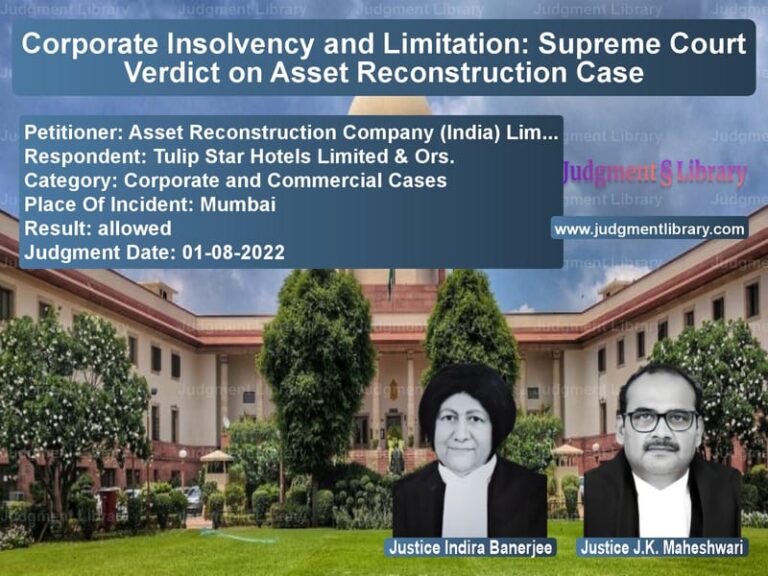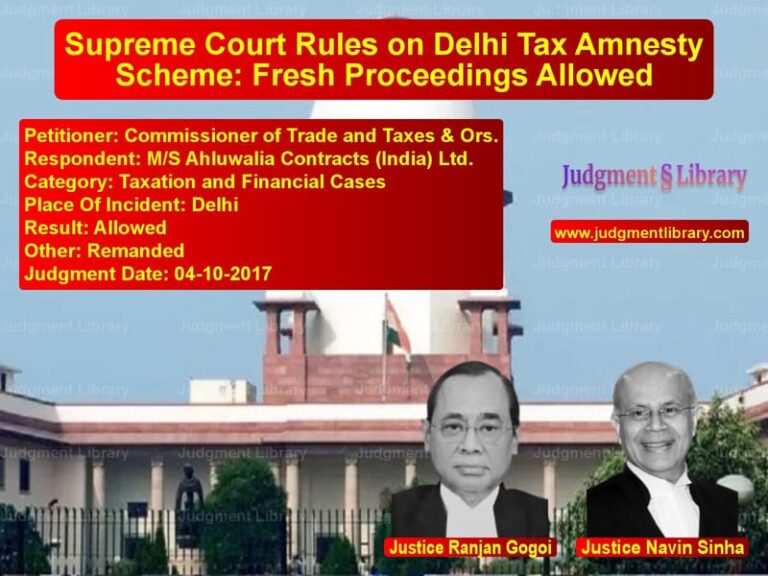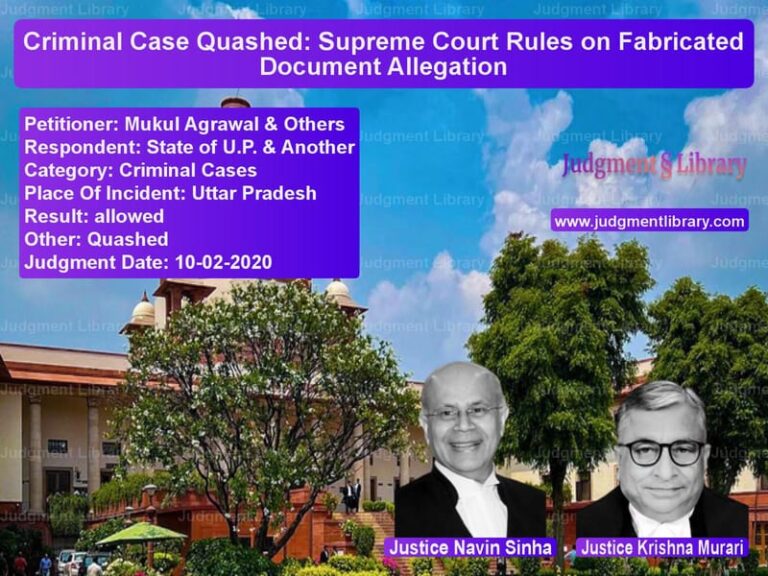Consumer Penalties Not Covered Under IBC Moratorium: Supreme Court Dismisses Builder’s Appeal
The Supreme Court of India recently delivered a landmark ruling in Saranga Anilkumar Aggarwal v. Bhavesh Dhirajlal Sheth & Ors., addressing whether penalties imposed by the National Consumer Disputes Redressal Commission (NCDRC) on real estate developers can be stayed under the Insolvency and Bankruptcy Code, 2016 (IBC). The judgment clarifies that consumer protection penalties are regulatory in nature and do not fall under the definition of ‘debt’ under the IBC, meaning that they cannot be shielded by insolvency proceedings.
Background of the Case
The case arose from multiple complaints filed by homebuyers against the appellant, Saranga Anilkumar Aggarwal, the proprietor of East & West Builders (RNA Corp. Group Co.). The complaints alleged delays in possession, deficiency in service, and contractual breaches.
The NCDRC, in its final order dated August 10, 2018, directed the developer to:
- Complete construction and obtain the occupancy certificate.
- Hand over possession of the flats.
- Pay compensation for the delays.
Due to continued non-compliance, the NCDRC imposed 27 penalties on the developer. Subsequently, homebuyers filed execution applications seeking enforcement of the penalties.
Meanwhile, insolvency proceedings were initiated against A.A. Estates Pvt. Ltd., to which the appellant was a personal guarantor. The appellant argued that an interim moratorium under Section 96 of the IBC was triggered, thereby staying all pending legal proceedings, including those under Section 27 of the Consumer Protection Act, 1986 (CP Act).
Petitioner’s (Appellant’s) Arguments
The appellant sought a stay on penalty proceedings and raised the following key points:
- Since insolvency proceedings had been initiated, all debt-related proceedings should be stayed under Section 96 of the IBC.
- The penalties imposed by NCDRC were in effect financial obligations and should be treated as debts under the IBC.
- The NCDRC’s penalties were a form of debt recovery, which should fall under the moratorium.
- Consumer protection penalties are quasi-criminal in nature and should be treated like other financial liabilities subject to the IBC moratorium.
Respondents’ (Homebuyers’) Arguments
The homebuyers contested the appellant’s arguments, stating:
- The penalties imposed by the NCDRC were not financial debts but rather regulatory measures to enforce compliance with consumer protection laws.
- The penalties aimed to deter unfair trade practices and protect homebuyers’ rights.
- If such penalties were covered under the IBC moratorium, it would set a dangerous precedent allowing developers to evade consumer protection obligations.
- The legislative intent behind the Consumer Protection Act is to ensure justice for consumers, and its penalties cannot be nullified through insolvency proceedings.
Supreme Court’s Analysis
The Supreme Court examined the following legal aspects:
1. Interpretation of the IBC Moratorium
The Court clarified that the interim moratorium under Section 96 of the IBC applies only to debt recovery proceedings. It does not extend to regulatory penalties imposed for violation of consumer rights.
“Penalties imposed for non-compliance with consumer protection laws do not constitute ‘debt’ under the IBC. A consumer protection penalty is a public law obligation and not a private financial liability.”
2. Distinction Between Civil and Regulatory Proceedings
The Court emphasized the difference between debt enforcement proceedings and regulatory penalties. It noted that:
- Debt recovery seeks to repay financial obligations to creditors.
- Regulatory penalties ensure compliance with public law obligations.
Therefore, Section 27 of the CP Act, which allows consumer forums to impose penalties, is not affected by the IBC moratorium.
3. Judicial Precedents Considered
- P. Mohanraj & Others v. Shah Brothers Ispat Pvt. Ltd. (2021) – Moratorium under IBC applies to recovery proceedings but not criminal liability.
- Satyawati v. Rajinder Singh (2013) – Delay in execution proceedings deprives decree-holders of their rightful relief.
- Vijay Madanlal Chaudhary v. Union of India (2021) – Orders granting ‘no coercive action’ do not equate to a stay on all proceedings.
4. Effect of IBC Moratorium on Consumer Protection Penalties
The Court ruled that:
- The penalties imposed by the NCDRC serve a regulatory purpose and do not qualify as financial debts.
- If IBC moratoriums were extended to such penalties, it would undermine consumer rights and embolden developers to escape accountability.
- The NCDRC penalties were intended to enforce compliance rather than recover a financial debt.
Final Judgment
The Supreme Court dismissed the appeal, stating:
“The penalties imposed by the NCDRC are regulatory in nature and do not constitute ‘debt’ under the IBC. The moratorium under Section 96 of the IBC does not extend to regulatory penalties imposed for non-compliance with consumer protection laws. The appeal is dismissed, and the appellant is directed to comply with the penalties within eight weeks.”
Key Takeaways from the Judgment
- Consumer penalties are not financial debts: The ruling affirms that penalties imposed by consumer forums serve a regulatory function and cannot be stayed by invoking insolvency laws.
- Developers must comply with consumer protection laws: This decision reinforces the accountability of real estate developers towards homebuyers.
- IBC moratorium has limited scope: It applies only to financial debts and does not extend to regulatory fines and penalties.
- Prevention of abuse of insolvency laws: The Court ensured that developers cannot misuse the IBC to evade compliance with consumer laws.
Conclusion
The Supreme Court’s decision sets a vital precedent in protecting homebuyers’ rights. By ruling that regulatory penalties under consumer protection laws do not fall under the IBC moratorium, the Court has ensured that real estate developers remain accountable for their commitments. This ruling will serve as a guiding principle for similar cases, reinforcing the judiciary’s stance on consumer rights and fair business practices.
Petitioner Name: Saranga Anilkumar Aggarwal.Respondent Name: Bhavesh Dhirajlal Sheth & Ors..Judgment By: Justice Vikram Nath, Justice Prasanna B. Varale.Place Of Incident: Mumbai, Maharashtra.Judgment Date: 04-03-2025.
Don’t miss out on the full details! Download the complete judgment in PDF format below and gain valuable insights instantly!
Download Judgment: saranga-anilkumar-ag-vs-bhavesh-dhirajlal-sh-supreme-court-of-india-judgment-dated-04-03-2025.pdf
Directly Download Judgment: Directly download this Judgment
See all petitions in Consumer Rights
See all petitions in Debt Recovery
See all petitions in Damages and Compensation
See all petitions in Judgment by Vikram Nath
See all petitions in Judgment by Prasanna Bhalachandra Varale
See all petitions in dismissed
See all petitions in supreme court of India judgments March 2025
See all petitions in 2025 judgments
See all posts in Civil Cases Category
See all allowed petitions in Civil Cases Category
See all Dismissed petitions in Civil Cases Category
See all partially allowed petitions in Civil Cases Category







